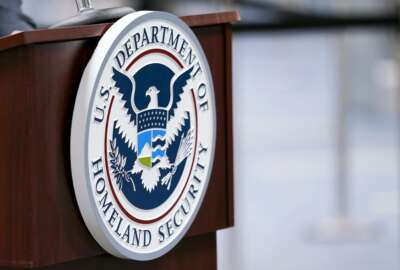Senate takes big step to avoid government shutdown
In today's Federal Newscast: President Biden plans to nominate a new second-in-command at the State Department. Military families could see improvements to housing,...
- The Senate takes a big step to avoid a government shutdown. The departments of Veterans Affairs, Agriculture, Transportation, Housing and Urban Development, and other related agencies are a step closer to getting full funding and off the continuing resolution carousel. The Senate passed a mini-omnibus appropriations bill yesterday 82-15. Among the highlights is that VA would receive $85 million more in discretionary funding this year as compared to 2023. The Food and Drug Administration, which is part of the USDA bill, would see a $20 million increase in funding this year. The Federal Aviation Administration's budget of $20 billion includes funding for 1,800 new air traffic controllers. The Senate plans to work on other mini-bus bills over the next few weeks to stave off a potential November 18 government shutdown. (Overwhelming Passage of Senate Minibus, Next Steps for Appropriations - Senate Appropriations Committee)
- Unions are urging a quick finalization of a proposed rule aiming to block the return of Schedule F. That proposed rule from the Office of Personnel Management seeks to clarify and reinforce worker protections for career, non-political federal employees. OPM's move was a direct attempt to prevent the possible revival of Schedule F. That now-revoked executive order tried to reclassify tens of thousands of feds to make them at-will and easier to fire. Federal unions and other stakeholders have largely come out in favor of OPM's new proposal and called for a final rule as soon as possible. Still, the proposed rule will remain open to public comments until Nov. 17. (Federal labor coalition urges ‘prompt’ finalization of OPM’s anti-Schedule F proposal - Federal News Network)
- President Joe Biden is planning to pick a new second-in-command at the State Department. Biden intends to nominate Kurt Campbell, a National Security Council coordinator for Indo-Pacific Affairs, to serve as the department’s deputy secretary. Campbell previously served as Deputy Assistant Secretary of Defense for Asian and Pacific Affairs. Campbell would take over for former Deputy Secretary Wendy Sherman, who stepped down in July.
- The Department of Homeland Security has a plan to grade the cybersecurity of its contractors. DHS has a new method for evaluating the cybersecurity of companies before awarding a contract. The department’s plan comes amid longstanding concerns about whether hackers can steal sensitive government data from the networks for contractors. But DHS will not take the same approach as the Defense Department’s Cybersecurity Maturity Model Certification (CMMC) program. DHS will measure cyber readiness based on analyzing a company’s responses to a security questionnaire. (DHS lays out new ‘cybersecurity readiness’ metrics for contractors - Federal News Network)
- The Biden administration is setting new rules for how federal agencies should step up the use of artificial intelligence tools. The Office of Management and Budget is giving agencies 60 days to name a chief AI officer who will spur adoption of these emerging tech tools and manage risks surrounding them. Agencies also have until August 2024 to make sure AI tools, used to deliver federal benefits and many other functions, meet minimum safety requirements. Vice President Kamala Harris discussed OMB’s draft guidance at an AI Security Summit in the United Kingdom. “President Biden and I reject the false choice that suggests we can either protect the public or advance innovation," Harris said. (OMB tells agencies to name chief AI officer to accelerate tech adoption across government - Federal News Network)
- The third cohort of the U.S. Digital Corps will begin accepting new applicants starting November 6. The General Services Administration, which oversees the program, said the fellows span five technology “tracks”: software engineering, data science and analytics, product management, design and cybersecurity. In the first two cohorts, more than 90 digital fellows have worked for 19 agencies on an assortment of projects. Applications for this third cohort are due by November 17. For those interested in the program, GSA will hold information sessions starting today, and every business day, through next Tuesday.
- Military members and their families could see improvements to housing, child care and school-meal access under a series of bills making their way through the legislative process. For example, one bill would help military families find temporary housing if they’re on a permanent housing waitlist for longer than 10 days. Another bill would make it easier for military school children to qualify for free or reduced school meals.(Military families could see improved housing, childcare and school meal support - Federal News Network)
- The Army is setting up a digital contracting center of excellence over the next few months. Young Bang, the assistant secretary of the Army for Acquisition, Logistics and Technology, said this will be a hub and resource to train officers and make contracting more seamless across different Army shops. Bang said it will serve as a guide for other contracting centers to help them with contracts and templates. (Army to set up digital contracting center in the coming months - Young Bang, principal deputy, assistant secretary of the Army for Acquisition, Logistics and Technology, said at an AFCEA DC event.)
- Employees in the Defense Health Agency are seeing broader union representation. The Federal Labor Relations Authority has now certified 17 DHA offices, along with DHA headquarters. Employees in those locations will be represented by the American Federation of Government Employees. There are currently 45,000 civilian employees at DHA that are part of AFGE. The union chapter largely expanded after the Defense Department transferred tens of thousands of health care workers to the relatively new agency.(AFGE now represents Defense Health Agency workers in 18 locations - American Federation of Government Employees)
- Agencies are giving the public more time to offer feedback on major contractor cybersecurity proposals. The comment period for two acquisition rules has been extended until February 2. One proposed rule would set requirements for “Cyber Threat and Incident Reporting and Information Sharing.” Another rule would standardize cybersecurity requirements for unclassified federal information systems. (FAR Federal Register publications requesting comments - Acquisition.gov )
Copyright © 2024 Federal News Network. All rights reserved. This website is not intended for users located within the European Economic Area.
Peter Musurlian
Peter Musurlian is a producer at Federal News Network.
Follow @PMusurlianWFED






